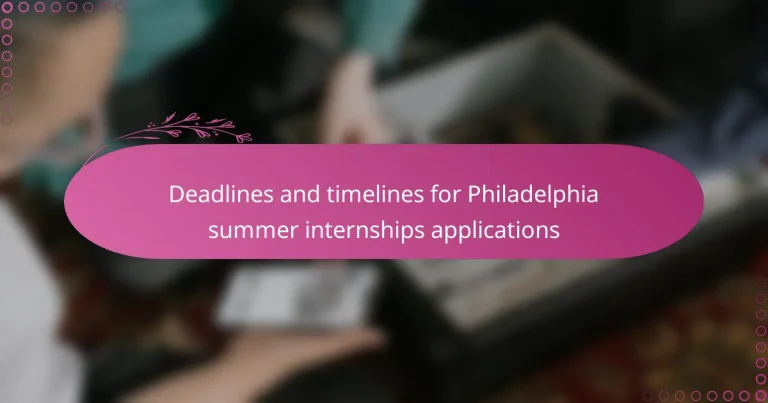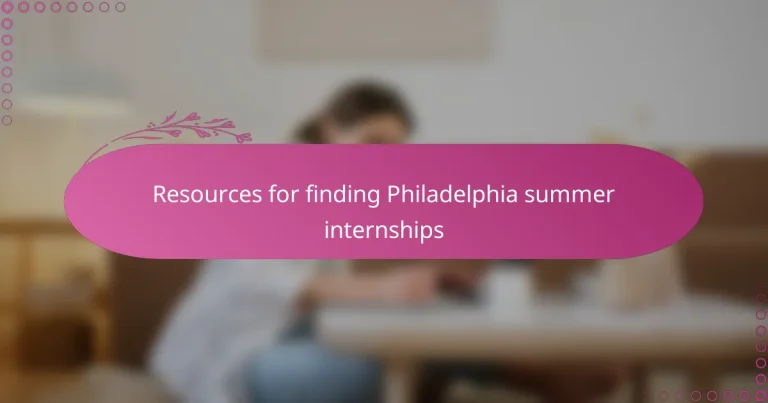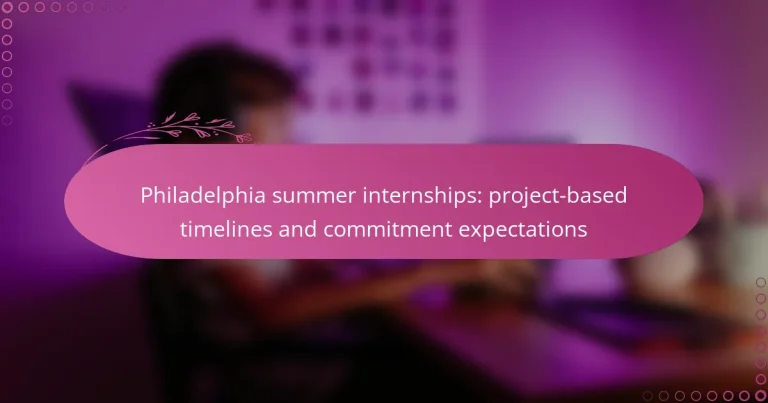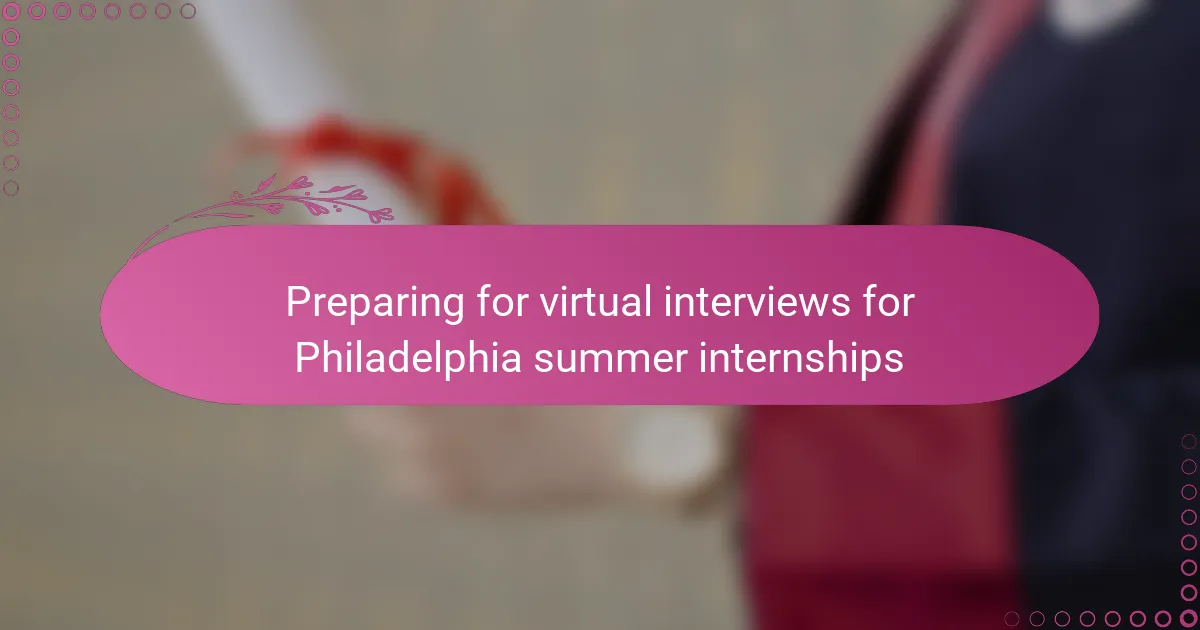

What are the key considerations for preparing for virtual interviews for Philadelphia summer internships?
Key considerations for preparing for virtual interviews for Philadelphia summer internships include understanding the technology, preparing your environment, and practicing interview skills. Familiarize yourself with the video conferencing platform used by the employer. Ensure you have a stable internet connection and test your audio and video settings beforehand. Choose a quiet, well-lit space to minimize distractions. Dress professionally, as you would for an in-person interview. Research the company and the role to tailor your responses. Prepare answers to common interview questions and have questions ready for the interviewer. Practicing with a friend or mentor can also enhance your confidence. These steps can significantly improve your performance in virtual interviews.
How can candidates effectively research companies before interviews?
Candidates can effectively research companies before interviews by utilizing multiple resources. They should start by visiting the company’s official website to understand its mission, values, and products. Candidates can also explore the “About Us” section for company history and leadership information.
Social media platforms, especially LinkedIn, offer insights into company culture and employee experiences. Job review sites like Glassdoor provide employee feedback and salary information. Candidates should read recent news articles to stay updated on company developments and industry trends.
Networking with current or former employees can yield valuable firsthand insights. Candidates can also check for any recent press releases or announcements to understand the company’s current focus.
This multi-faceted approach equips candidates with a comprehensive understanding of the company, enhancing their interview preparation.
What tools can assist in gathering information about potential employers?
Online job boards are essential tools for gathering information about potential employers. Websites like LinkedIn provide insights into company culture and employee reviews. Glassdoor offers salary information and interview experiences shared by past candidates. Company websites often include mission statements, values, and recent news updates. Social media platforms can reveal company activities and community engagement. Networking events allow direct interactions with current employees. Professional associations may provide industry-specific insights about employers. These tools collectively enhance understanding of potential employers and their work environments.
How can understanding company culture enhance interview performance?
Understanding company culture can significantly enhance interview performance. When candidates grasp the values and norms of a company, they can tailor their responses to align with those principles. This alignment demonstrates cultural fit, which is often a key factor in hiring decisions. Candidates who reflect the company’s culture can build rapport with interviewers. Furthermore, understanding culture allows candidates to ask insightful questions. These questions can show genuine interest and engagement. Research indicates that candidates who align with company culture are more likely to be hired. A study by the Harvard Business Review found that cultural fit can predict job performance and retention. Thus, knowledge of company culture is crucial for interview success.
What technical preparations are necessary for virtual interviews?
Technical preparations for virtual interviews include ensuring a reliable internet connection. A stable connection minimizes interruptions during the interview. Use a computer or device with a functioning camera and microphone. This setup allows for clear communication with the interviewer. Test the audio and video settings prior to the interview. This ensures that both are working correctly. Choose a quiet, well-lit location for the interview. This enhances visibility and reduces background noise. Familiarize yourself with the video conferencing platform being used. Knowing how to navigate the platform can prevent technical issues. Finally, have a backup plan in case of technical difficulties. This could include a phone number to call if the video connection fails.
How can candidates ensure their technology is reliable for the interview?
Candidates can ensure their technology is reliable for the interview by conducting thorough pre-interview checks. They should test their internet connection to confirm it is stable and fast enough for video calls. A wired connection is generally more reliable than Wi-Fi. Candidates should also check their device’s hardware, including the camera and microphone, to ensure they function properly. Using a reputable video conferencing platform is essential, as it minimizes technical issues. Additionally, candidates should update their software and applications to the latest versions before the interview. They should consider conducting a practice interview with a friend to identify any potential problems. These steps help mitigate technical disruptions during the actual interview, enhancing their chances of success.
What are the best practices for setting up a virtual interview space?
Choose a quiet location with minimal distractions for the virtual interview space. Ensure good lighting, preferably natural light, to enhance visibility. Position the camera at eye level to create a more engaging atmosphere. Use a clean and neutral background to avoid distractions. Test your technology, including internet connection and software, before the interview. Dress professionally, as you would for an in-person interview. Prepare necessary materials, such as your resume and notes, within reach. Finally, practice good posture and maintain eye contact with the camera to convey confidence.
What common interview questions should candidates expect?
Candidates should expect common interview questions that assess their qualifications and fit for the role. Typical questions include “Tell me about yourself,” which allows candidates to summarize their background. Another frequent question is “What are your strengths and weaknesses?” This helps interviewers understand self-awareness and areas for improvement. Candidates may also face situational questions like “Describe a challenge you faced and how you overcame it.” This evaluates problem-solving skills. Additionally, “Why do you want to work here?” gauges motivation and alignment with the company’s values. Lastly, candidates might be asked about their long-term career goals to assess future aspirations. These questions are standard in interviews across various industries and provide insight into a candidate’s suitability for the position.
How can candidates prepare thoughtful responses to behavioral questions?
Candidates can prepare thoughtful responses to behavioral questions by using the STAR method. The STAR method stands for Situation, Task, Action, and Result. Candidates should identify relevant past experiences that showcase their skills. They need to outline the context of the situation clearly. Next, they should describe the specific task they were responsible for. Candidates must explain the actions they took to address the task. Finally, they should highlight the positive results of their actions. Practicing these responses can help candidates articulate their experiences confidently. Research shows that structured responses improve interview performance.
What strategies can help in articulating career goals during the interview?
To articulate career goals during the interview, candidates should practice clear and concise communication. Start with a specific goal statement that aligns with the internship position. For example, state your desire to gain experience in a particular field or skill set. Use the STAR method to provide context, detailing the Situation, Task, Action, and Result of past experiences related to your goals. Tailor your goals to reflect the company’s mission and values. Research the company beforehand to ensure alignment. Be prepared to discuss how the internship will help you achieve your long-term career aspirations. This approach demonstrates foresight and commitment to your professional development.
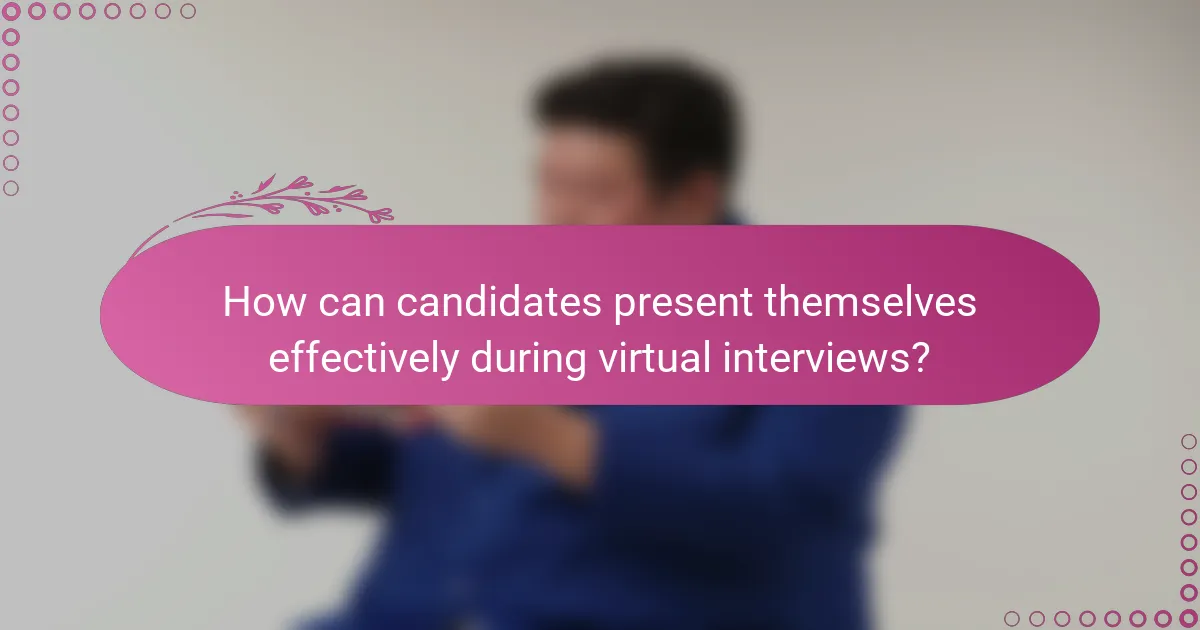
How can candidates present themselves effectively during virtual interviews?
Candidates can present themselves effectively during virtual interviews by maintaining professionalism and clear communication. They should dress appropriately, similar to an in-person interview. A tidy background and good lighting enhance visibility. Technical preparation is crucial; candidates must ensure their devices function properly. Practicing responses to common interview questions improves confidence. Additionally, maintaining eye contact with the camera fosters engagement. Researching the company demonstrates genuine interest. According to a 2021 study by Jobvite, 87% of recruiters value candidates who exhibit strong communication skills.
What role does body language play in virtual interviews?
Body language plays a crucial role in virtual interviews. It conveys confidence and engagement to the interviewer. Positive body language includes maintaining eye contact, using hand gestures, and having an open posture. These signals indicate attentiveness and enthusiasm. Research shows that non-verbal cues can influence hiring decisions significantly. For instance, a study by the National Center for Biotechnology Information found that body language can affect perceptions of professionalism. Thus, effective body language enhances the overall impression in virtual interviews.
How can candidates maintain eye contact and engage with interviewers?
Candidates can maintain eye contact and engage with interviewers by looking directly at the camera during virtual interviews. This simulates direct eye contact and fosters a connection. Additionally, candidates should practice active listening by nodding and responding appropriately. Using a confident posture can also enhance engagement. Candidates should minimize distractions in their environment to maintain focus. Preparing thoughtful questions shows interest and encourages interaction. Research indicates that effective eye contact can increase perceived confidence and trustworthiness. Studies show that candidates who engage visually are more likely to leave a positive impression.
What are the best practices for dressing professionally in a virtual setting?
Dressing professionally in a virtual setting involves wearing attire that reflects a professional image. Choose clothing that is appropriate for the industry you are in. Solid colors often work better than busy patterns on camera. Ensure that your clothing is clean, pressed, and fits well. Avoid overly casual items like t-shirts or sweatpants. Consider the background of your video call; neutral colors can help you stand out. Pay attention to grooming; neat hair and minimal accessories enhance professionalism. Research indicates that first impressions are formed within seconds, making appearance crucial for virtual interactions.
How can candidates showcase their skills and experiences effectively?
Candidates can showcase their skills and experiences effectively by tailoring their resumes and cover letters to the specific internship. They should highlight relevant experiences that align with the internship requirements. Using quantifiable achievements enhances credibility. For example, stating “increased sales by 20%” provides clear evidence of impact. Additionally, candidates can prepare a portfolio showcasing their work samples. Engaging in mock interviews can also improve their presentation skills. Research indicates that candidates who practice their responses perform better in interviews. Furthermore, utilizing the STAR method (Situation, Task, Action, Result) helps structure responses to behavioral questions. This method allows candidates to convey their experiences clearly and effectively.
What formats can be used to present a portfolio or work samples virtually?
Digital portfolios can be used to present a portfolio or work samples virtually. These can include websites showcasing projects and skills. PDF documents are also common for structured presentations. Slide decks, such as PowerPoint or Google Slides, allow for visual storytelling of work. Video presentations can effectively demonstrate skills and projects in action. Social media platforms can serve as informal portfolios, especially for creative fields. Online platforms like Behance or LinkedIn are tailored for professional showcases. Each format provides unique ways to engage potential employers and highlight relevant work experience.
How can storytelling enhance the presentation of personal experiences?
Storytelling enhances the presentation of personal experiences by creating emotional connections. It allows individuals to share their narratives in a relatable manner. Engaging stories capture attention and make experiences memorable. According to a study by Paul Zak, stories can trigger the release of oxytocin, fostering empathy. This emotional engagement makes the audience more receptive to the message. Moreover, storytelling provides context, helping to illustrate key points effectively. By framing personal experiences within a narrative, candidates can demonstrate their skills and values more vividly. This technique is particularly useful in virtual interviews, where establishing rapport is crucial.
What follow-up actions should candidates take after the interview?
Candidates should send a thank-you email to the interviewer promptly. This email should express appreciation for the opportunity to interview. It should also reiterate interest in the position. Candidates can mention specific topics discussed during the interview. This personal touch can make the email stand out. Following up within 24 hours is considered best practice. Candidates may also inquire about the next steps in the hiring process. This shows continued interest and professionalism. Research indicates that timely follow-ups can improve candidates’ chances of being remembered positively.
How can sending a thank-you note impact the candidate’s chances?
Sending a thank-you note can positively impact a candidate’s chances of securing a position. It demonstrates professionalism and appreciation for the interviewer’s time. A well-crafted note can reinforce the candidate’s interest in the role. It serves as a reminder of the candidate’s qualifications and fit for the position. Research indicates that candidates who send thank-you notes are perceived more favorably by hiring managers. A survey by Accountemps found that 80% of executives appreciate receiving a thank-you note. This simple gesture can differentiate a candidate in a competitive job market.
What should candidates include in their follow-up communication?
Candidates should include a thank you note in their follow-up communication. This expresses gratitude for the opportunity to interview. They should also reiterate their interest in the position. Mentioning specific aspects of the interview can strengthen their message. Candidates can highlight relevant skills or experiences discussed during the interview. Providing any additional information that may support their candidacy is beneficial. A polite closing statement encourages further communication. Timeliness is crucial; follow-up should occur within 24-48 hours after the interview.

What are some tips for success in virtual interviews for Philadelphia summer internships?
Prepare your environment by ensuring a quiet, well-lit space. Use a reliable internet connection to avoid disruptions. Dress professionally to create a positive impression. Research the company and role thoroughly to demonstrate interest. Practice common interview questions to articulate your responses clearly. Maintain eye contact by looking at the camera instead of the screen. Use body language to convey engagement and confidence. Follow up with a thank-you email to express gratitude and reinforce your interest.
How can candidates manage interview anxiety effectively?
Candidates can manage interview anxiety effectively by preparing thoroughly. Preparation includes researching the company and understanding the role. Practicing common interview questions builds confidence. Candidates should also rehearse their responses in front of a mirror or with a friend. Deep breathing exercises can help calm nerves before the interview. Visualization techniques, such as imagining a successful interview, can reduce anxiety. Staying organized with a checklist of materials needed for the interview can alleviate stress. Finally, maintaining a positive mindset and reminding oneself of past successes can further help in managing anxiety.
What relaxation techniques can be employed before the interview?
Breathing exercises can be employed before the interview. Deep breathing helps reduce anxiety and promotes calmness. Individuals can practice inhaling deeply through the nose and exhaling slowly through the mouth. This technique can lower heart rate and alleviate stress. Progressive muscle relaxation is another effective method. It involves tensing and then relaxing different muscle groups. This process releases physical tension and enhances relaxation. Visualization techniques can also be beneficial. Imagining a successful interview can boost confidence and reduce nervousness. Mindfulness meditation is a further option. Focusing on the present moment can improve mental clarity and calmness. Each of these techniques has been shown to enhance relaxation before high-pressure situations like interviews.
How can practice interviews help in building confidence?
Practice interviews help in building confidence by providing a realistic simulation of the interview experience. They allow candidates to familiarize themselves with common questions and interview formats. This preparation reduces anxiety associated with unexpected scenarios. Engaging in practice interviews enables individuals to refine their responses and improve articulation. Feedback from peers or mentors during these sessions enhances self-awareness. Research shows that repeated exposure to interview situations can lead to increased comfort and performance. A study by the University of Florida found that candidates who practiced reported a 30% increase in confidence levels. Overall, practice interviews serve as a crucial tool in boosting self-assurance for actual interviews.
What resources are available for candidates seeking additional support?
Candidates seeking additional support for preparing for virtual interviews can access various resources. Career services at universities often provide guidance and workshops. Online platforms like LinkedIn Learning offer courses on interview techniques. Local organizations may host networking events to connect candidates with professionals. Many internship programs have mentorship opportunities for personalized support. Additionally, job search websites frequently feature articles on interview preparation. These resources help candidates enhance their skills and build confidence.
Which online platforms offer mock interview services?
Online platforms that offer mock interview services include Pramp, Interviewing.io, and HireVue. Pramp provides peer-to-peer mock interviews for various job roles. Interviewing.io allows users to practice technical interviews anonymously with engineers from top tech companies. HireVue offers AI-driven mock interviews that help users prepare for behavioral and technical questions. These platforms are widely recognized for their effectiveness in preparing candidates for real interviews.
How can networking with alumni enhance interview preparedness?
Networking with alumni enhances interview preparedness by providing insider insights and advice. Alumni can share their experiences with specific companies and interview processes. They often offer tips on what employers look for in candidates. Engaging with alumni can lead to mock interviews, helping to practice responses. Alumni may also provide feedback on resumes and cover letters. Building these connections can increase confidence through shared knowledge. Studies show that networking improves job search success rates, emphasizing its value.
The main entity of the article is “virtual interviews for Philadelphia summer internships.” This article provides essential considerations for candidates preparing for these interviews, including technical preparations, effective research strategies, and the importance of understanding company culture. It outlines best practices for setting up a virtual interview space, common interview questions, and techniques for presenting oneself professionally. Additionally, it highlights the significance of follow-up actions post-interview and offers resources for further support, ensuring candidates are well-equipped to succeed in their internship applications.
